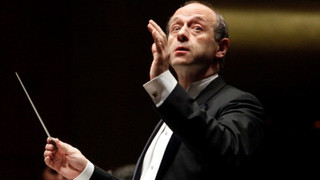|
Back
A Major Mighty Orchestra New York
Avery Fisher Hall, Lincoln Center
01/18/2015 -
Fanny Mendelssohn: Three Songs: “Mainacht” – “Ferne” – “Gondellied” (Arranged by Sándor Balogh)
Felix Mendelssohn: Violin Concerto in E Minor, Opus 64
Johannes Brahms: Symphony No. 3 in F Major, Opus 90
Anna Lucia Richter (Soprano), Isabelle Faust (Violinist)
Budapest Festival Orchestra, Iván Fischer (Conductor/Musical Director)

I. Fischer (© Richard Termine)
When the true story about Iván Fischer’s creation of the Budapest Festival Orchestra is told, music historians and moralists will marvel at how this great musician faced the most harrowing odds from the Hungarian Government, and how–to say the least–he triumphed.
I was in Budapest during that time editing a magazine, watching Mr. Fischer’s Gargantuan effort to distance himself from the of horde mediocre orchestras formed under the old Communist regime. Yet not even he would realize that the Budapest Festival Orchestra, which he would audition, train and bring up to his standards, would surpass its provincial origins, becoming one of the mighty orchestras of the world.
Yet that was so apparent yesterday afternoon as Mr. Fischer conducted a more than satisfying Brahms Third Symphony. This, the least performed of the four, is usually lauded for its naturalness, its ease. “Natural”, though, is not necessarily art. If this was a painting, Ivan Fischer would have been a Watteau, transforming “natural” mere notes to inspired colors.
Mr. Fischer is the most cosmopolitan of conductors, but I doubt if he wanted to eliminate the Budapest Festival Orchestra Mitteleuropean warmth in its strings. Not a schmaltzy warmth, but rounded, a sound polished but never glossy. From those first chords, Mr. Fischer gave the violins and violas an unforced elegance, a sound of sweeping wholeness.
Yet as the movement continued, Mr. Fischer didn’t pay much attention to Brahms’ con brio. This was a maestoso movement, dominant, altering timbres in every measure. The Brahms wind consorts changed subtly, and Mr. Fischer accented those subtle tints. By placing his eight double basses brashly at the very rear of the orchestra by the timpani, he broadened even the dark sounds, leading to a spacious recapitulation.
The second movement can sound austere, but Mr. Fischer, with an excess of rubato, with lingering solos, gave it that same unfettered Romantic richness, while the third movement, while not exceedingly rapid, was given a straightforward lift.
I won’t attempt to describe the finale. Mr. Fischer began with a certain violence, a kind of muted tragedy, but conducted even the segues with care, mothered the climaxes and ended with a calm, not triumphant glow.
This was great music played with greatness. And while he conducted the Budapest Festival Orchestra with equally fine temperament for the Mendelssohn Violin Concerto, Isabelle Faust was not the fiddler for such an orchestra. She began unsteadily, but soon–with the aid of the “Sleeping Beauty” Stradivarius–got back into tempo.
She knows her fingering, had no problems in sailing through the cadenza and the three movements, but her somewhat automated playing was perhaps fit for another conductor.
The real novelty, three orchestrated songs by Felix’s sister Fanny, was introduced by the conductor to “inspire” other women composers to write. Well, we have plenty in America, and I doubt if Fanny’s work would inspire them. But nobody that I knew ever realized that Fanny had written four-hundred pieces, most of which were under her brother’s name.

A. L. Richter (© www.annaluciarichter)
The soloist, Anna Luisa Richter, is blessed with a light effortless soprano voice which did justice to two of the songs (“May Night”, “Song of the Gondolier”), strophic salon piano pieces which not even orchestrator Sándor Balogh could disguise.
But the second work, “Distance”, was a little masterpiece. Mr. Balogh had written a flute ostinato throughout the work played by Erika Sebök. Yet the song itself could have fit in easily as one of Felix’s Songs Without Words. The melody, the modulations and Ms. Richter’s voice were without parallel.
Those leaving early missed an original encore. The orchestra scattered around the stage, Ms. Richter returned, and the whole ensemble sang a Dvorák part-song, Evening Serenade.
Iván Fischer obviously took enormous delight in this novelty. The audience, which turned out in force despite the icy rain, was equally and deservedly delighted.
Harry Rolnick
|